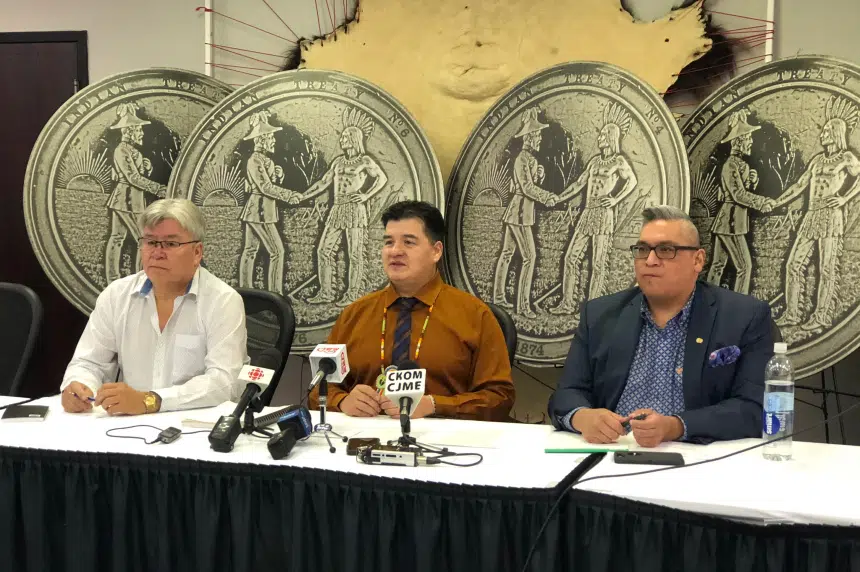The Federation of Sovereign Indigenous Nations (FSIN) is rolling out drafted child welfare legislation across Canada, but there’s one thing standing in the way.
A lack of funding, even with the passing of Bill C-92 in June, is plaguing their plans.
Wednesday morning, the FSIN announced they were looking for help from both the provincial and federal governments.
FSIN Chief Bobby Cameron said their legislation would be sent to “all 634 First Nation’s across this country,” including the 74 bands in Saskatchewan.
“The solutions are within our First Nation’s chief and councils, our elders, our parents, our caregivers, our guardians. The solutions are there,” he said.
“The experts for our own children, are our own people. We understand our own language, our own culture. We understand where the needs are for First Nation’s children.”
Bill C-92 gave jurisdiction to First Nations groups to implement their own welfare legislation across Canada.
Cameron said they were “elated” when the bill passed, but there still is one issue they keep running into: funding.
“Without funding, this whole Bill C-92 will fail. It’s a message for the federal government: ‘work with the First Nation partners, directly with the First Nation communities,'” Cameron said.
Cameron said the actual monetary number they’re looking for is “substantial.” He said the long-term sustainable funding should be there if the federal government is serious about fixing the issue.
Cameron said their First Nations are prepared to “in some cases” launch legal action on the federal government with the current systems.
On the provincial side, Cameron went as far as saying it would be an “option” to join the fight against the carbon tax in exchange for the funding.
“We can do better together. We can be a force to be reckoned with when we want to assert and put pressure on federal governments for funding, to get rid of the carbon tax, we can do things together. This is our hope at the FSIN.”
Cameron said they’re going to be meeting with provincial Minister of Social Services, Paul Merriman, on December 17.
They’re also planning a meeting in the “next week or two” with federal Indigenous Services Minister Marc Miller.
FSIN Second Vice-Chief David Pratt also spoke Wednesday, unveiling a polarizing statistic for Indigenous mothers in the past year.
He said 324 maternity birth seizures have taken place in the province with children going directly into social services.
Over that same time frame in British Columbia, only two birth seizures took place.
Cameron said that was another example of the issues that lie in the social service systems, but it doesn’t stop there.
“We look at the numbers of our children who fall through the cracks, who are graduating from the care system in the provincial government into the jails and penitentiaries,” he said.
“The impacts are devastating. The impacts are so overwhelming for some of our people, it’s a feeling of hopelessness.”
Cameron said on average, 25 children are dying every year due to addictions, and issues stemming from the social service systems in the province.
Around 200,000 Indigenous children are in social service systems in Canada, with around 10,000 of those being from the province, he added.
Cameron said pushing the funding, and pushing the federal government to take action is “paramount” for their inherent treaty rights, and the safety of Indigenous children.
“We owe it to our children to do this.”
Province doesn’t “intend to politicize” carbon tax, child welfare issues
The provincial government responded to Cameron’s “option” to join the fight against the carbon tax in exchange for the funding Wednesday afternoon.
In a written statement, the province said, “while both issues raised by Chief Cameron are important to Saskatchewan people, they are independent of one another. We do not intend to politicize these issues by linking them together.”
They agreed that welfare of all children in Saskatchewan is of the “utmost” importance.
The province also reaffirmed their stance on the federally imposed carbon tax.
“We agree that the federally imposed carbon tax is ineffective and does not recognize the realities of rural or remote communities,” they stated.
The province said the implementation of Bill C-92 is ongoing, and their priority lies in the safety and well-being of Saskatchewan children.
“Along with a number of Provinces and Territories, Saskatchewan remains concerned that a number of details regarding the implementation of Bill C-92 remain outstanding, including measures to ensure accountability of child welfare agencies. We agree that a stable source of federal funding is critical to the implementation of Bill C-92,” the statement reads.











